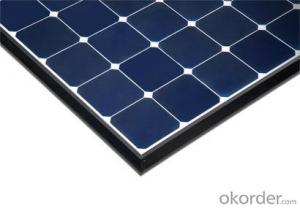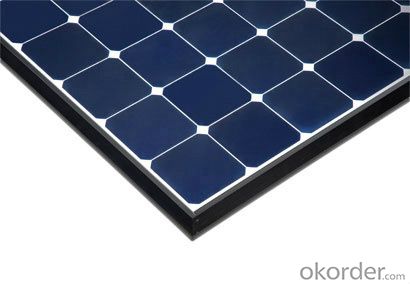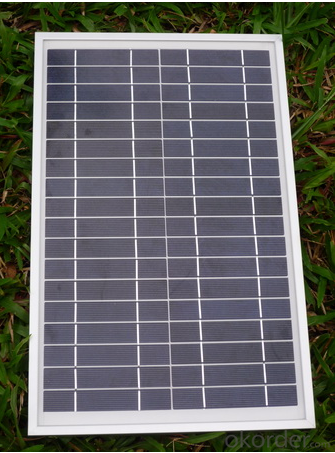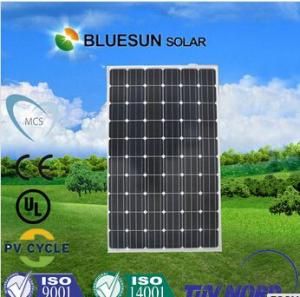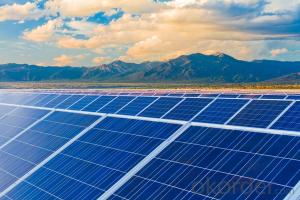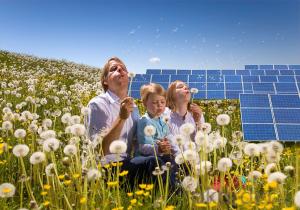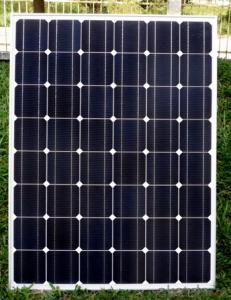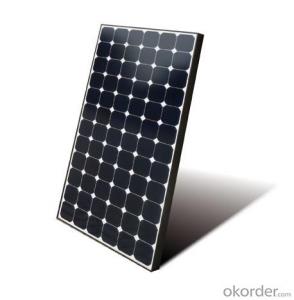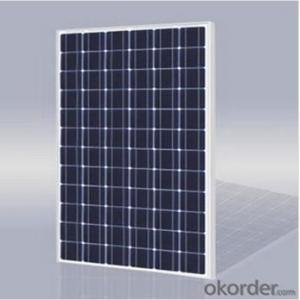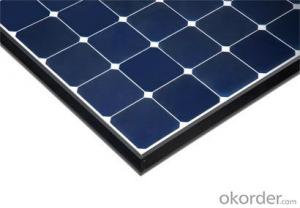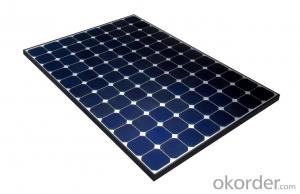CNBM Poly Solar Panel 270W A Grade for 2500 Sq Ft Home with Factory Price
- Loading Port:
- Shanghai
- Payment Terms:
- TT OR LC
- Min Order Qty:
- 100 watt
- Supply Capability:
- 100000 watt/month
OKorder Service Pledge
OKorder Financial Service
You Might Also Like
Specification
CNBM Poly Solar Panel 270W A Grade with Factory Price
Production description
A solar panel is a collection of solar cells. Lots of small solar cells spread over a large area can work together to provide enough power to be useful. The more light that hits a cell, the more electricity it produces, so spacecraft are usually designed with solar panels that can always be pointed at the Sun even as the rest of the body of the spacecraft moves around, much as a tank turret can be aimed independently of where the tank is going.
A photovoltaic (in short PV) module is a packaged, connected assembly of typically 6×10 solar cells. Solar Photovoltaic panels constitute the solar array of a photovoltaic system that generates and supplies solar electricityin commercial and residential applications. Each module is rated by its DC output power under standard test conditions, and typically ranges from 100 to 365 watts. The efficiency of a module determines the area of a module given the same rated output – an 8% efficient 230 watt module will have twice the area of a 16% efficient 230 watt module.
solar modules use light energy (photons) from the sun to generate electricity through the photovoltaic effect. The majority of modules use wafer-based crystalline silicon cells or thin-film cells based on cadmium telluride or silicon. The structural (load carrying) member of a module can either be the top layer or the back layer. Cells must also be protected from mechanical damage and moisture. Most solar modules are rigid, but semi-flexible ones are available, based on thin-film cells. These early solar modules were first used in space in 1958.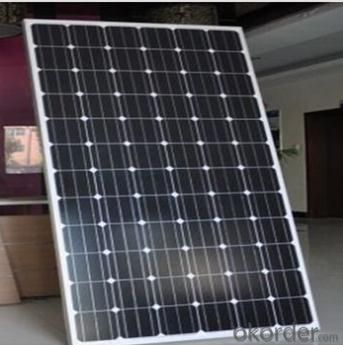
Application
Aerospace
Residential
Commercial
Large solar power plant
Distributed plant
Product Feature
1.A grade high efficiency solar cells.
2.TUV/UL/CE/CEC etc
3.Fast shippment
4.25 years warranty
5.OEM
Package
24pcs into one carton, 312pcs into a 20 foot container, 728pcs into a 40 foot container.
- Q: Are there any health risks associated with solar panels?
- Overall, solar panels do not pose significant health risks. They are a safe and environmentally friendly source of energy. However, some minor risks can include potential electrical hazards during installation or maintenance, such as electric shock or fire. Additionally, the production and disposal of solar panels may involve certain toxic materials, although efforts are made to minimize their impact. Nonetheless, these risks are generally well-managed and can be mitigated through proper installation, maintenance, and adherence to safety guidelines.
- Q: Can solar panels be installed on a military vehicle or equipment?
- Yes, solar panels can be installed on military vehicles or equipment. In fact, several military forces around the world have already started incorporating solar panels onto their vehicles and equipment as a means of reducing reliance on traditional fuel sources and enhancing energy efficiency. This not only helps reduce carbon emissions but also provides a sustainable and reliable source of power for various operations and equipment on the field.
- Q: I want to install a solar panel system and our power grid can't work in reverse(so it get its electricity from us). My question is how do you prevent electricity from our panel to go to the grid without disconnecting the grid? How can we also use the grid and the panel at the same time when the panel are not creating enough power?PS dont say ask an electrician
- If you are grid-tied, then a standard solar electric system will always feed back into the grid if you are not utilizing more power in your home than is being generated by the solar panels and inverter system. It is possible that a grid isolation device designed to prevent direct back feeding is available, but haven't heard of one in common use. New laws in most areas of the US are now mandating that utilities allow grid-tied alternative energy systems. Double-check you local laws. Sometimes you can't take the utilities word for truth--most will automatically say 'no' and will only relent when you show up with the law in hand. Unfortunately, some utilities have figured out another way to shut down alternative energy pioneers--they demand multimillion dollar insurance policies covering damage that their equipment could sustain from your little PV system. Technically, they are still in compliance with the law, they just make it impossible for a homeowner to meet their requirements. If you are getting the runaround, go to your state representative for help. It's amazing how contrite those utility people can be when a state senator (or even US Senator) has just sent a letter asking them why they are stonewalling a law-abiding and well-meaning citizen. Good luck, and don't give up!
- Q: Can solar panels be used in areas with high pollution levels?
- Yes, solar panels can be used in areas with high pollution levels. While pollution may slightly reduce the efficiency of solar panels by blocking some sunlight, they can still generate electricity. In fact, using solar panels in such areas can be beneficial as they provide a clean and renewable energy source, helping to reduce reliance on polluting fossil fuels.
- Q: Are there any government incentives or rebates for installing solar panels?
- Yes, there are various government incentives and rebates available for installing solar panels. These incentives can include federal tax credits, state and local grants, and utility rebates. These programs aim to encourage the adoption of renewable energy sources and can significantly offset the upfront costs of installing solar panels. It is advisable to check with local authorities and utilities to determine the specific incentives and rebates available in a particular area.
- Q: Is it possible for a 2V rated panel to charge a bank of batteries equal to around 36V? I believe that the panels should equal or exceed the voltage of the batteries but, I'm not for certain.
- You're right. The solar panels must produce a voltage equal to or slightly greater than that of the batteries. So you need to either switch to a 2 volt battery or add two more solar panels of the same current rating.
- Q: Installing solar panels requires a big initial investment. Before I make this investment I want to check to see if the money I will save by installing solar panels will actually pay for this investment, in the long run. To calculate my savings, we should consider the area (square feet) I currently have available to install solar panels. Look at the available sunlight and its intensity in my state each month of the year. Based on this data estimate how much energy my solar panel will generate. Then compare that with how much energy (kWh) I currently consume based on my electricity bill.
- you have a really good formula for figuring out what you will save. as long as you dont live the the arctic during the winter months you should be fine! this investment will definitely pay off in the long run and help the environment. just like the other guy said, the utility company would have to pay you back any excess energy you produce that you dont use! you can calculate how much your average electric bill is and then compare by how much you would be saving. you can multiply the number by 5 and 0 years and so on to see how much you would save ultimately! this is a great way to save your own money and never have to be dependent on the electric company again! yes you will definitely need a battery to hold a charge for overnight use good luck!
- Q: Can solar panels be used to power a construction site?
- Yes, solar panels can be used to power a construction site. They can provide a sustainable and renewable source of energy, reducing the need for traditional fuel-based generators and minimizing carbon emissions. Solar panels can be installed on rooftops or on portable structures, providing electricity to power tools, lighting, and other equipment required on a construction site. Additionally, excess energy generated by solar panels can be stored in batteries for use during non-sunlight hours, ensuring continuous power supply.
- Q: Can solar panels be used to power a skyscraper?
- Yes, solar panels can be used to power a skyscraper. With advancements in solar technology, larger and more efficient panels can be installed on rooftops or facades of skyscrapers, harnessing sunlight to generate electricity. However, the power generated may not be sufficient to fully meet the energy demands of a skyscraper, so a combination of solar power with other renewable sources or traditional energy grids might be needed.
- Q: Can solar panels be used in areas with high levels of dust?
- Yes, solar panels can still be used in areas with high levels of dust. While excessive dust can reduce the efficiency of solar panels by blocking sunlight, regular cleaning and maintenance can help mitigate this issue. Additionally, advancements in technology, such as self-cleaning panels or coatings that repel dust, are being developed to further enhance the performance of solar panels in dusty environments.
Send your message to us
CNBM Poly Solar Panel 270W A Grade for 2500 Sq Ft Home with Factory Price
- Loading Port:
- Shanghai
- Payment Terms:
- TT OR LC
- Min Order Qty:
- 100 watt
- Supply Capability:
- 100000 watt/month
OKorder Service Pledge
OKorder Financial Service
Similar products
Hot products
Hot Searches
Related keywords
